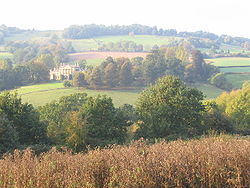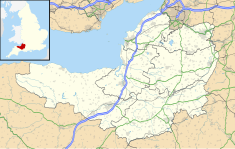Shockerwick House: Difference between revisions
refine category, replaced: Category:1750 architecture → Category:Buildings and structures completed in 1750 using AWB |
add {{Use dmy dates}} for sub-projects of WP:WikiProject England |
||
| (14 intermediate revisions by 7 users not shown) | |||
| Line 1: | Line 1: | ||
{{Use dmy dates|date=April 2022}} |
|||
{{Infobox Historic Site |
{{Infobox Historic Site |
||
| name =Shockerwick House |
| name =Shockerwick House |
||
| Line 6: | Line 7: | ||
| locmapin = Somerset |
| locmapin = Somerset |
||
| map_caption = |
| map_caption = |
||
| coordinates = {{coord|51|24|04|N|2|18|14|W|display=inline,title}} |
|||
| lat_degrees =51 |
|||
| ⚫ | |||
| lat_minutes =24 |
|||
| lat_seconds =04 |
|||
| lat_direction =N |
|||
| long_degrees =2 |
|||
| long_minutes =18 |
|||
| long_seconds =14 |
|||
| long_direction =W |
|||
| ⚫ | |||
| area = |
| area = |
||
| built =c. 1750 |
| built =c. 1750 |
||
| Line 28: | Line 22: | ||
| designation2_date = |
| designation2_date = |
||
| designation2_number = |
| designation2_number = |
||
| designation3 = |
|||
| designation3_offname = |
|||
| designation3_date = |
|||
| designation3_number = |
|||
| designation4 = |
|||
| designation4_offname = |
|||
| designation4_date = |
|||
| designation4_number = |
|||
| designation5 = |
|||
| designation5_offname = |
|||
| designation5_date = |
|||
| designation5_number = |
|||
}} |
}} |
||
'''Shockerwick House''' in [[Bathford]], [[Somerset]], England was built as a [[manor house]] around 1750 by [[John Wood the Elder]]. It has been designated as a Grade I [[listed building]].<ref name="IoE">{{cite web|url= |
'''Shockerwick House''' in [[Bathford]], [[Somerset]], England was built as a [[manor house]] around 1750 by [[John Wood, the Elder]]. It has been designated as a Grade I [[listed building]].<ref name="IoE">{{cite web|url=https://historicengland.org.uk/listing/the-list/list-entry/1157865|title=Shockerwick House|work=historicengland.org.uk|publisher=English Heritage|accessdate=2009-07-19}}</ref> It is set in {{convert|7.7|ha|acre}} of parkland<ref name=parks/> within the [[Bybrook River]] valley. |
||
The site was a manor prior to its purchase in 1740, from the estate of Anthony Carew,<ref>{{cite web|title=Shockerwick House|url=http://www.bathfordsociety.org.uk/content/buildings/shockerwick_house_main.htm|publisher=Bathford Society|accessdate=22 December 2012}}</ref> by the Wiltshire family. The Wiltshires commissioned [[John Wood, the Elder]] to design the house and grounds. [[Thomas Gainsborough]] was a frequent visitor and painted several canvases in the orangery of the house including that of Edward Orpin, Parish Clerk of Bradford-upon-Avon which is now in the [[Tate]].<ref>{{cite web|title=Edward Orpin, Parish Clerk of Bradford-upon-Avon|url=http://www.tate.org.uk/art/artworks/hone-edward-orpin-parish-clerk-of-bradford-upon-avon-n00760|publisher=Tate Gallery|accessdate=22 December 2012}}</ref> Another visitor was [[William Pitt the Younger]] who was at Shockerwick when he heard about [[Napoleon]]'s victory at the [[Battle of Austerlitz]].<ref name=parks>{{cite web|title=Shockerwick House, Bath, England |url=http://www.parksandgardens.org/places-and-people/site/2969|work=Parks and Gardens UK|publisher=Parks and Gardens Data Services Ltd|accessdate=9 June 2013}}</ref> |
|||
The house was altered in 1896 by E. George and A. B. Yeates. It is now used as offices and a nursing home.<ref name="IoE"/> |
|||
In the 1880s the house was bought by [[Charles Morley (Breconshire MP)|Charles Morley]] the [[Member of Parliament]] for [[Breconshire (UK Parliament constituency)|Breconshire]].<ref name=parks/> The house was altered in 1896 by [[Ernest George]] and [[Alfred B. Yeates]]. <ref name="IoE"/> The Morley family owned the house until 1955. In 1961 it was bought by [[Henry Pelham-Clinton-Hope, 9th Duke of Newcastle]] who sold it in 1970 to the [[W.D. & H.O. Wills]] tobacco company who used it as a training centre.<ref name=parks/> |
|||
It is set in parkland within the [[Bybrook River]] valley. |
|||
[[File:Shockerwick House in 1790.jpg|thumb|Shockerwick House. Ink wash on paper by [[Samuel Hieronymus Grimm]] in 1790]] |
|||
Since 1983 it has been used as a Nursing Home and is run by [[Bupa]].<ref>{{Cite web|title=Shockerwick House Care Home {{!}} Bupa UK|url=https://www.bupa.co.uk/care-services/care-homes/shockerwick-house-bath|access-date=2021-08-16|website=www.bupa.co.uk|language=en-GB}}</ref> |
|||
==See also== |
==See also== |
||
| Line 54: | Line 39: | ||
{{reflist}} |
{{reflist}} |
||
[[Category: |
[[Category:Houses completed in 1750]] |
||
[[Category:Grade I listed buildings in Somerset]] |
[[Category:Grade I listed buildings in Bath and North East Somerset]] |
||
[[Category: |
[[Category:Grade I listed houses in Somerset]] |
||
{{Somerset-struct-stub}} |
|||
{{UK-listed-building-stub}} |
|||
Latest revision as of 02:47, 20 April 2022
| Shockerwick House | |
|---|---|
 | |
| Location | Bathford, Somerset, England |
| Coordinates | 51°24′04″N 2°18′14″W / 51.40111°N 2.30389°W |
| Built | c. 1750 |
Listed Building – Grade I | |
| Designated | 1 February 1956[1] |
| Reference no. | 32269 |
Shockerwick House in Bathford, Somerset, England was built as a manor house around 1750 by John Wood, the Elder. It has been designated as a Grade I listed building.[1] It is set in 7.7 hectares (19 acres) of parkland[2] within the Bybrook River valley.
The site was a manor prior to its purchase in 1740, from the estate of Anthony Carew,[3] by the Wiltshire family. The Wiltshires commissioned John Wood, the Elder to design the house and grounds. Thomas Gainsborough was a frequent visitor and painted several canvases in the orangery of the house including that of Edward Orpin, Parish Clerk of Bradford-upon-Avon which is now in the Tate.[4] Another visitor was William Pitt the Younger who was at Shockerwick when he heard about Napoleon's victory at the Battle of Austerlitz.[2]
In the 1880s the house was bought by Charles Morley the Member of Parliament for Breconshire.[2] The house was altered in 1896 by Ernest George and Alfred B. Yeates. [1] The Morley family owned the house until 1955. In 1961 it was bought by Henry Pelham-Clinton-Hope, 9th Duke of Newcastle who sold it in 1970 to the W.D. & H.O. Wills tobacco company who used it as a training centre.[2]

Since 1983 it has been used as a Nursing Home and is run by Bupa.[5]
See also
[edit]References
[edit]- ^ a b c "Shockerwick House". historicengland.org.uk. English Heritage. Retrieved 19 July 2009.
- ^ a b c d "Shockerwick House, Bath, England". Parks and Gardens UK. Parks and Gardens Data Services Ltd. Retrieved 9 June 2013.
- ^ "Shockerwick House". Bathford Society. Retrieved 22 December 2012.
- ^ "Edward Orpin, Parish Clerk of Bradford-upon-Avon". Tate Gallery. Retrieved 22 December 2012.
- ^ "Shockerwick House Care Home | Bupa UK". www.bupa.co.uk. Retrieved 16 August 2021.

